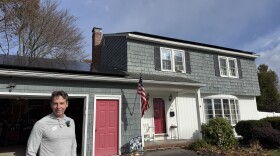New Hampshire’s Public Utilities Commission held its first hearing on rules for community power programs Monday.
The rules would set the stage for municipalities to start purchasing electricity on behalf of residents, in programs made possible by a state law from 2019.
Towns across New Hampshire are adopting and planning out programs. But before they can start, the Public Utilities Commission must make rules for how they will work, and what the relationship between community power programs and utility companies will look like.
Clifton Below, the vice-chair of the Community Power Coalition of New Hampshire, said the rules will be foundational for community power – which advocates say can bring cheaper and greener electricity to towns across New Hampshire.
“I think a lot of municipalities and local activists are frustrated by the lack of movement at the state level. So there's a lot of interest in, what can we do at the community level?” he said.
The rules proposed to the PUC were developed in a stakeholder process that included utility companies, said Henry Herndon, a community power consultant who spoke at the hearing in support of the rules. Kelly Buchanan, director of legislative and regulatory affairs with Clean Energy New Hampshire, also spoke in favor of the proposed rules.
The rules are meant to balance the interests of community power aggregation committees and the state’s utility companies, and their customers. Among other issues, they address the sharing of utility company data that is needed to plan and operate community power programs.
Dan Venora, an attorney representing Eversource, told commissioners that the company supports community power programs. But, he said, some of the rules would be too expensive or difficult for the utility to comply with based on limitations to the company’s billing and customer systems.
“Some of the provisions within the proposed rules would require costly and labor-intensive efforts for services that are not essential to a successful aggregation,” he said.
Other utilities expressed similar concerns, saying they supported community power but were worried about the costs they might incur to comply with some of the provisions.
“Any sort of custom configuration or change to our existing processes or data requirements will require custom programming, which is cost as well as time,” said Michael Licata, representing the NH Electric Cooperative.
Utility representatives were not specific about which provisions posed problems, but Venora said the utilities would jointly include more details in written comments to the commission.
One piece of information the utilities keep – data on which customers use net metering – is critical information for fledgling community power programs, Clifton Below said. That’s the kind of information he said utilities may not have accessible.
“In a sense, we're leaving a certain amount of trust here to the utilities to be the judge of whether they know the information and whether it’s readily available,” he said.
The PUC is accepting written comments on the rules until March 14th. A guide for the public to provide written comments can be found here.
The commission decided Monday they would allow stakeholders to extend the conversation by replying to each other’s comments until March 28th.








